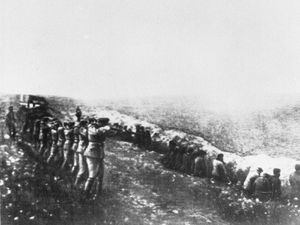German probe targets 95-year-old Nazi death squad suspect
The case against Wilhelm Karl Friedrich Hoffmeister is part of an 11th-hour effort to bring elderly ex-Nazis to justice.

German prosecutors are investigating a suspected former member of Adolf Hitler’s mobile killing squads for involvement in Second World War massacres.
The case against 95-year-old Wilhelm Karl Friedrich Hoffmeister is part of an 11th-hour effort to bring elderly ex-Nazis to justice, the Associated Press has learned.
It is the third case opened in Germany in recent months targeting individuals believed to have been part of the Einsatzgruppen death squads.
All three are being investigated under a new legal argument, recently upheld by the country’s top criminal court, that someone who helped the Nazi killing machinery run can be convicted of accessory to mass murder, even if they cannot be linked to specific deaths.
Efraim Zuroff, the head Nazi hunter at the Simon Wiesenthal Centre in Jerusalem, who alerted German authorities about the new suspects.
“It was a very significant decision, but it’s only one that has been reaching fruition in recent months after we helped them find now three people who fit the category,” he said.
Extending the legal standard on complicity from death camp guards to the Einsatzgruppen raises the possibility of a fresh wave of investigations, said Efraim Zuroff, the head Nazi hunter at the Simon Wiesenthal Centre in Jerusalem, who alerted German authorities about the new suspects.
“It was a very significant decision, but it’s only one that has been reaching fruition in recent months after we helped them find now three people who fit the category,” he said.
“It’s not exactly clear why it took them so long.”
The Einsatzgruppen were the Nazis’ opening salvo in the Holocaust — SS units and police personnel who followed the regular army as it pushed into the Soviet Union in 1941, slaughtering perceived racial or political enemies in mass executions.
Estimates vary, but experts agree they were responsible for more than a million killings.
The Nazis later established their system of death camps partially due to concerns about the psychological effects the up-close mass killings were having on the Einsatzgruppen troops.
“The death camps and concentration camps … became the iconic images of the Holocaust, but it was the Einsatzgruppen that were maybe even a more stark manifestation of the Nazi ideology and the Final Solution,” Mr Zuroff said.
“The number of active (Einsatzgruppen) participants is much greater than the number who actually carried out the murders in the death camps.”
Hoffmeister, a former SS Rottenfuehrer — roughly equivalent to corporal — is suspected of serving with one of the death squads in Ukraine.
Einsatzgruppe C was responsible for the shootings of nearly 34,000 people at Babi Yar, a ravine north west of Kiev, on September 29 and 30 1941 — one of the largest and most notorious of the mass executions by Einsatzgruppen.
The German federal prosecutors’ office in Ludwigsburg that investigates Nazi war crimes has established that Hoffmeister was in Ukraine with the unit around that time, but has not linked him to any specific killings, said Jens Rommel, the head of the office.
“We don’t know what he did on what day,” Mr Rommel said.
His office does not have authority to file criminal charges, but determined there was enough evidence to recommend that prosecutors based near where Hoffmeister lives in a retirement home pursue accessory to murder charges against him.
Serving in the unit would not be enough on its own to secure a conviction, even under the updated evidentiary standard, so the prosecutors in Braunschweig need proof that Hoffmeister was present in some capacity when Einsatzgruppe C committed atrocities.
The argument that Germans who enabled war crimes could be charged with accessory to murder even if they did not personally pull a rifle trigger or put the poison in the gas chamber was first used successfully against former Ohio car worker John Demjanjuk in 2011.
Demjanjuk was convicted in Munich on allegations he served as a Sobibor death camp guard, which he denied. He died before his appeal could be heard.
The 2015 conviction of former Auschwitz guard Oskar Groening using the same argument was upheld the next year by Germany’s top criminal court on appeal, cementing the precedent.





